In the ever-evolving world of digital marketing, email remains a cornerstone of customer engagement and brand communication. As businesses seek to optimize their email marketing strategies, the choice of platform becomes crucial. Two prominent contenders in this space are Zoho Campaigns and iContact, each offering unique features and functionalities tailored to diverse marketing needs.
This comprehensive comparison delves into the intricacies of both platforms, examining their strengths, weaknesses, and suitability for different business types. By exploring key features, user experiences, and expert opinions, we aim to provide a detailed guide to help marketers make informed decisions in selecting the right email marketing tool for their specific requirements. Additionally, we will introduce Prism Reach, an innovative AI-powered SaaS solution that offers a streamlined approach to email marketing analytics, providing deeper insights with ease.
Key Facts
- Zoho Campaigns offers a free tier for up to 2,000 subscribers, while iContact focuses solely on paid plans.
- Both platforms provide drag-and-drop editors, A/B testing, and automation features, but Zoho Campaigns integrates seamlessly with the broader Zoho suite.
- iContact is known for its user-friendly interface, while Zoho Campaigns offers more advanced features for complex marketing workflows.
- Zoho Campaigns’ dynamic content feature allows for highly personalized emails based on recipient data.
- iContact’s advanced segmentation capabilities enable the creation of highly targeted lists based on user behavior and demographics.
- Prism Reach‘s AI-driven personalization can boost engagement rates by up to 40%, offering a cost-effective alternative to traditional email marketing tools.
Zoho Campaigns vs. iContact: Feature-Rich Platforms for Email Marketing Success
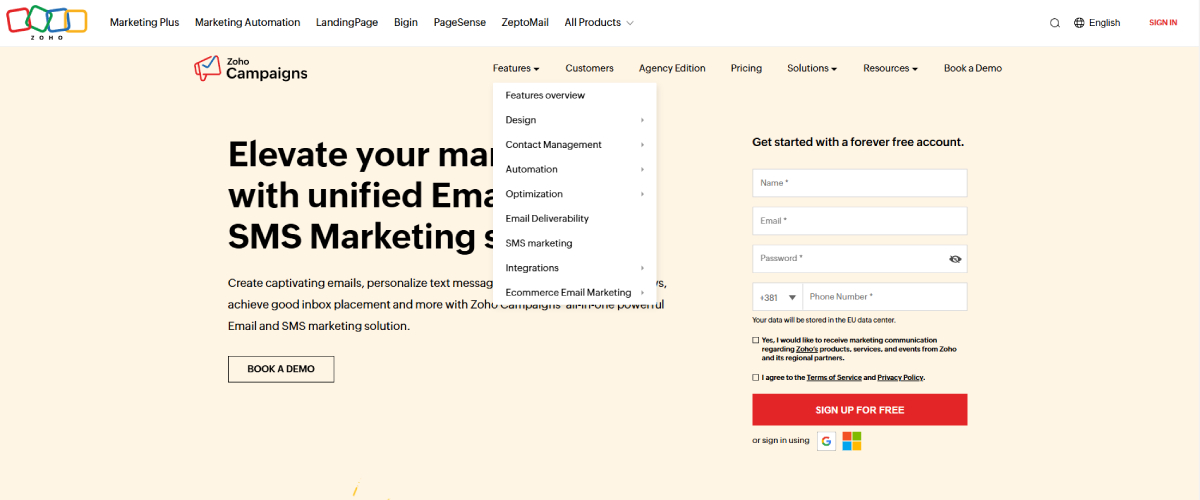
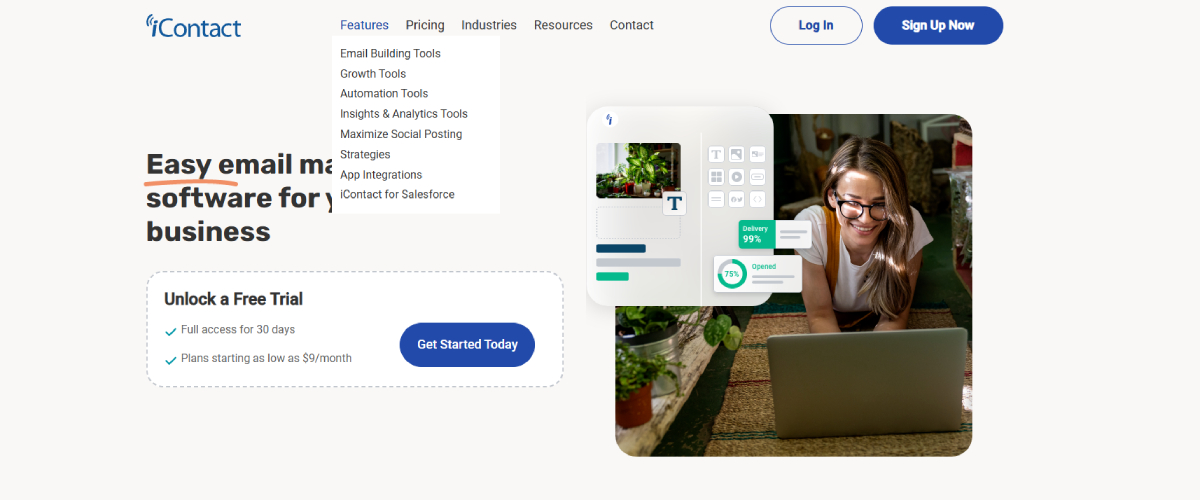
Integration and User Interface
Zoho Campaigns excels in integration, particularly within the Zoho ecosystem. This seamless connectivity enhances overall business workflow, making it ideal for companies already using Zoho products. The platform offers over 240 email templates, providing extensive design options. In contrast, iContact focuses on user-friendliness, catering to those without technical expertise. Its interface is designed for simplicity, making it attractive to small businesses and email marketing novices.
While iContact offers fewer templates, they are modern and industry-specific, ensuring relevance and appeal. Both platforms feature drag-and-drop editors, simplifying email creation. Zoho’s integration capabilities extend to social media platforms and webinar tools, while iContact offers robust third-party integrations with platforms like Salesforce and WordPress, enhancing its versatility for various business needs.
Automation and Advanced Features
In the realm of automation, Zoho Campaigns takes a clear lead with its advanced capabilities. The platform supports complex workflows, including autoresponders and behavior-triggered emails, catering to sophisticated marketing strategies. Zoho Campaigns also offers sophisticated A/B testing, detailed analytics, and custom report generation, making it a powerhouse for data-driven marketers.
iContact, while offering automation features, focuses on more basic functionalities. Its automation tools are suitable for smaller businesses or those new to email marketing, enabling simple automated responses and basic sequencing. However, as marketing needs grow more complex, the limitations of iContact’s automation capabilities become more apparent. Businesses looking to implement advanced, multi-step campaigns with nuanced behavioral triggers may find Zoho Campaigns’ offerings more aligned with their sophisticated marketing strategies.
Pricing Models and Scalability
Zoho Campaigns offers a more flexible pricing structure, including a free tier for up to 2,000 subscribers and 6,000 emails per month. This free option is particularly attractive for small businesses or those just starting with email marketing. Additionally, Zoho provides a pay-as-you-go plan, ideal for infrequent senders or those with fluctuating email volumes.
In contrast, iContact focuses solely on paid plans, without a free tier. However, iContact’s pricing is designed to be scalable, accommodating both small businesses and large enterprises. This approach ensures that as a business grows, iContact can continue to meet its evolving needs. Both platforms offer various pricing tiers based on subscriber count and email volume, allowing users to choose plans that best fit their requirements and budget constraints.
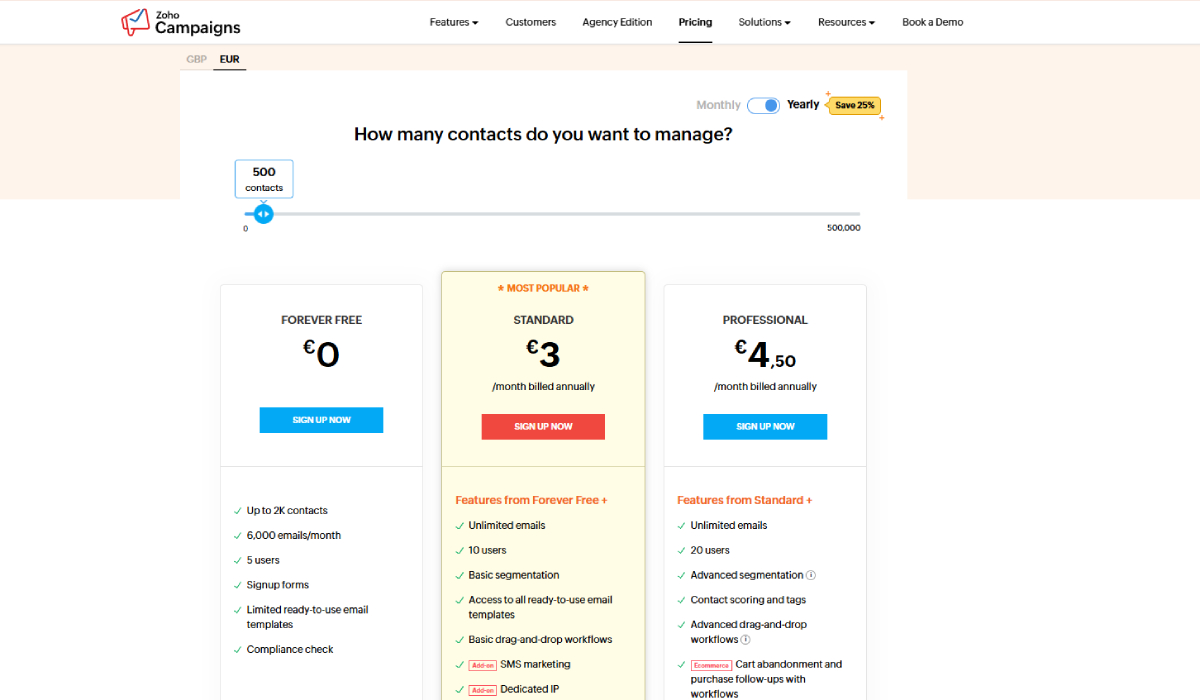
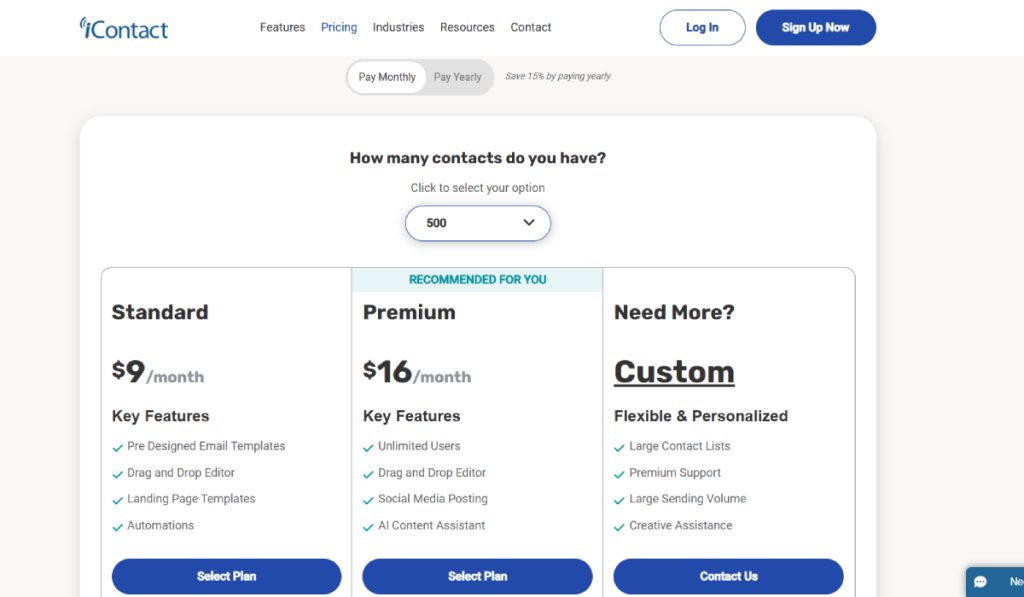
Compliance and Data Protection
Both Zoho Campaigns and iContact prioritize compliance with email marketing regulations and data protection laws. Zoho Campaigns includes specific tools to ensure adherence to anti-spam laws and regulations, as well as features to help businesses comply with GDPR. This focus on compliance is crucial for businesses operating in various jurisdictions.
iContact similarly emphasizes compliance, offering built-in spam-checking tools to increase deliverability and reduce bounce rates. Both platforms provide features for managing subscriber consent and opt-outs, which is essential for maintaining legal compliance. Zoho Campaigns offers additional features like spam testing before sending emails, while iContact provides tools for tracking email deliverability and offers tips for improvement. These compliance-focused features help businesses maintain a good sender reputation and avoid potential legal issues related to email marketing practices.
Analytics and Reporting Capabilities
Zoho Campaigns and iContact both offer robust analytics and reporting features, but with some differences in depth and customization. Zoho Campaigns provides detailed insights into email performance, including open rates, click-through rates, and subscriber engagement. It also offers the ability to generate custom reports based on specific metrics, allowing for tailored analysis of campaign performance.
iContact offers comprehensive metrics on email engagement, with tools for tracking conversions and ROI. Both platforms provide A/B testing capabilities to optimize email performance. Zoho Campaigns includes features for email previews across different devices and email clients, ensuring consistent appearance. iContact offers analytics on email deliverability and provides actionable insights for improvement. While both platforms offer strong reporting tools, Zoho Campaigns generally provides more advanced and customizable options for data analysis and visualization.
Innovative Solutions by Prism Reach
While Zoho Campaigns and iContact offer solid email marketing solutions, Prism Reach emerges as an innovative alternative that addresses some of the limitations of traditional platforms. Prism Reach’s AI-powered personalization takes email marketing to the next level, offering deep customization that goes beyond what Zoho Campaigns and iContact currently provide.
Prism Reach‘s ability to create detailed user avatars and personalize content based on subscriber behavior and preferences addresses a key challenge in email marketing: delivering highly relevant content to each recipient. This level of personalization can lead to significantly higher engagement rates, with publishers reporting up to a 40% increase in engagement.
Moreover, Prism Reach‘s focus on AI-driven content selection and optimal sending times aligns with the growing need for data-driven marketing strategies. While Zoho Campaigns and iContact offer some level of analytics and timing optimization, Prism Reach’s advanced AI algorithms provide a more sophisticated approach to content delivery and timing.
The platform’s quick setup and seamless integration process, along with its emphasis on GDPR compliance and data privacy, make it a compelling option for businesses looking to enhance their email marketing efforts while maintaining regulatory compliance.
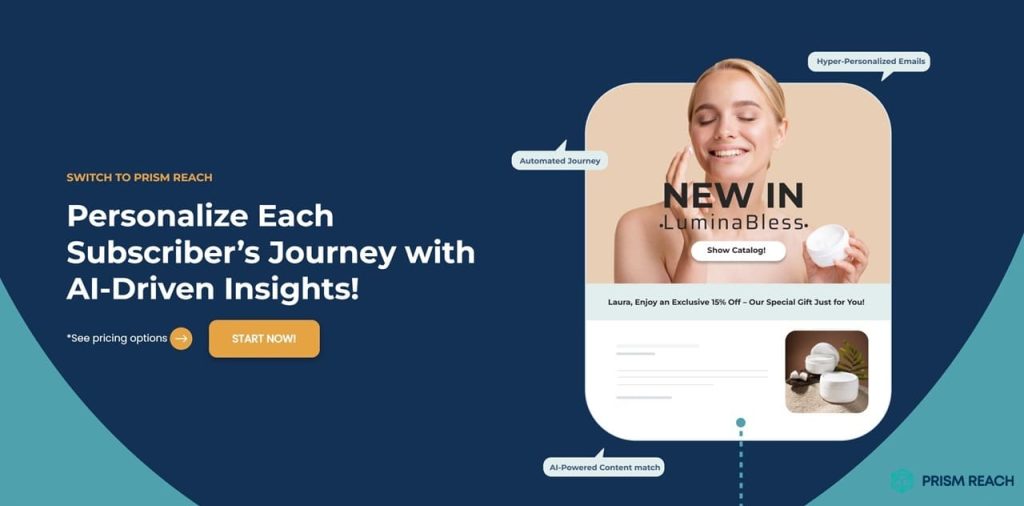
Integrating Hidden Gem Strategies to Enhance Email Marketing
To navigate the strengths and weaknesses of Zoho Campaigns and iContact, integrating hidden gem strategies can significantly enhance user experience and outcomes. Here are ten “hidden gem” strategies that can help users maximize the effectiveness of their email marketing efforts with these platforms:
1. Utilize Dynamic Content in Zoho Campaigns
Leverage Zoho Campaigns’ dynamic content feature to personalize emails based on recipient data. This allows you to show different content to different segments (e.g., location-based offers), enhancing engagement without creating multiple versions of the same email.
- Personalized Offers: Display unique offers based on the recipient’s location or past purchases.
- Relevant Content: Tailor content sections to match the interests and behaviors of different segments.
- Enhanced Engagement: Increase click-through rates by delivering more relevant and timely content.
2. Implement Advanced Segmentation in iContact
Use iContact’s advanced segmentation capabilities to create highly targeted lists based on user behavior, engagement history, or demographics. This can lead to more relevant campaigns and higher open rates.
- Behavior-Based Segmentation: Segment users based on actions like email opens, clicks, and website visits.
- Demographic Targeting: Create segments based on age, gender, location, and other demographic factors.
- Improved Campaign Relevance: Deliver content that is specifically tailored to the interests and needs of each segment.
3. Take Advantage of A/B Testing
Both platforms offer A/B testing, but many users overlook this feature. Regularly test subject lines, content formats, and send times to optimize your campaigns based on real data rather than assumptions.
- Subject Line Optimization: Determine which subject lines yield higher open rates.
- Content Format Testing: Identify whether text-heavy or image-rich emails perform better.
- Optimal Send Times: Find the best times to send emails for maximum engagement.
4. Automate Follow-Up Campaigns
Set up automated follow-up campaigns in both platforms. For instance, if a subscriber clicks a link but doesn’t make a purchase, trigger an email with a special offer or additional information about the product.
- Nurture Leads: Automatically send follow-up emails to nurture leads through the sales funnel.
- Increase Conversions: Encourage subscribers to complete purchases with targeted follow-ups.
- Personalized Engagement: Deliver personalized content based on subscriber interactions.
5. Use Integration with CRM Systems
Integrate Zoho Campaigns with Zoho CRM or iContact with Salesforce to streamline your marketing efforts. This integration allows you to leverage customer data for more personalized marketing and better tracking of customer interactions.
- Data Synchronization: Ensure that your email marketing data is seamlessly integrated with your CRM.
- Enhanced Personalization: Use CRM data to create more personalized and targeted email campaigns.
- Improved Tracking: Monitor customer interactions across both platforms for a comprehensive view of engagement.
6. Explore Email Template Customization
Both platforms offer customizable templates, but many users do not fully utilize this feature. Spend time customizing templates to reflect your brand’s identity, ensuring consistency across all communications.
- Brand Consistency: Maintain a consistent look and feel across all your email communications.
- Enhanced Design: Customize templates to better align with your brand’s unique style and messaging.
- Increased Recognition: Strengthen brand recognition through visually appealing and branded email templates.
7. Leverage Reports for Insights
Use the reporting features in both platforms not just to track open rates and click-through rates but also to analyze trends over time. Look for patterns in engagement that can inform future campaign strategies.
- Trend Analysis: Identify trends in subscriber behavior and engagement over time.
- Performance Optimization: Use insights from reports to optimize future campaigns for better performance.
- Strategic Planning: Inform your overall email marketing strategy based on data-driven insights.
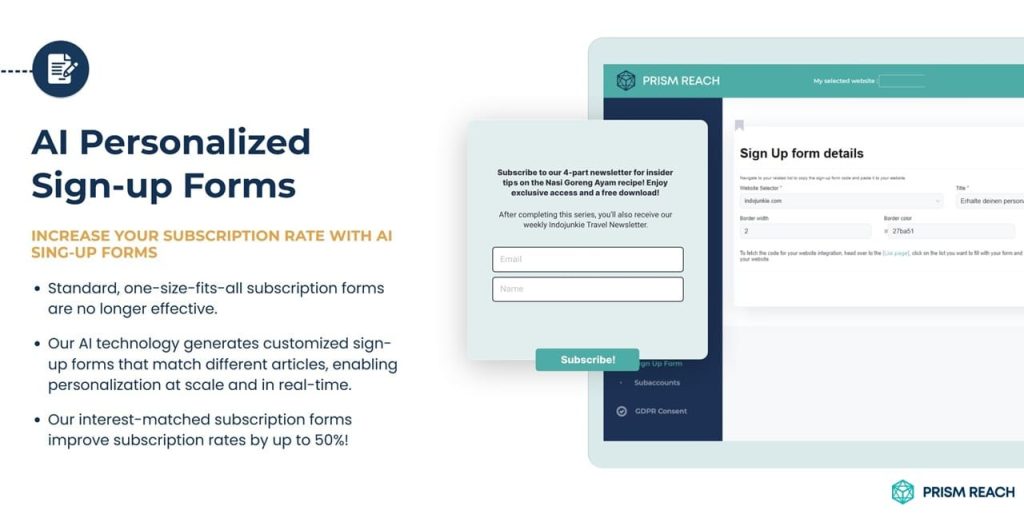
8. Create Engaging Signup Forms
Utilize the form-building features in both platforms to create engaging signup forms that capture user interest. Consider embedding forms on your website or using pop-ups that offer incentives for signing up.
- Increased Signups: Design attractive forms that encourage more users to subscribe.
- Data Collection: Gather valuable subscriber information through customized form fields.
- Enhanced User Experience: Create seamless and user-friendly signup processes.
9. Utilize Feedback Loops
Regularly collect feedback from your subscribers about what content they find valuable or what they would like to see more of. Use this information to tailor your campaigns and improve engagement.
- Subscriber Insights: Gain deeper understanding of your audience’s preferences and needs.
- Content Optimization: Adjust your content strategy based on subscriber feedback.
- Enhanced Engagement: Increase engagement by delivering content that resonates with your audience.
10. Participate in Training Webinars
Both Zoho Campaigns and iContact offer training resources and webinars. Engaging in these sessions can help you discover lesser-known features and best practices that can enhance your email marketing effectiveness.
- Stay Informed: Keep up-to-date with the latest email marketing trends and platform updates.
- Skill Enhancement: Improve your email marketing skills through expert-led training sessions.
- Discover Hidden Features: Learn about advanced features that can optimize your campaigns.
Prism Reach: Enhancing Cost-Effective Email Marketing
While overcoming the limitations of Zoho Campaigns and iContact through various strategies is possible, it often requires additional effort, resources, and technical expertise. Prism Reach offers a superior solution by providing advanced integration capabilities and AI-driven personalization, eliminating the need for cumbersome workarounds.
Company and Product Overview
Prism Reach’s core functionality revolves around its proprietary AI technology, which clusters website content and social media posts into relevant categories. This AI uses a variety of data points to create detailed user avatars, enabling personalized newsletter content that incorporates factors such as location, engagement history, and predicted interests. The system’s ability to analyze vast amounts of data allows for highly targeted marketing strategies.
Target Audience
The primary users of Prism Reach are publishers across various platforms, including international media outlets, blogs, and forums. The company has also set its sights on expanding into the eCommerce sector, aiming to leverage its technology to enhance digital marketing efforts in this rapidly growing area.
Key Features
- AI-Powered Personalization:
- Content Clustering: Utilizes both open and proprietary AI models to categorize content effectively.
- User Avatars: Enriches user data for creating highly personalized profiles.
- Personalized Introductions: Generates custom introduction paragraphs for each subscriber using advanced data analytics.
- Optimal Sending Times: Uses predictive analytics to determine the best times to send newsletters, maximizing subscriber engagement.
- Seamless Setup and Integration:
- Quick Setup: The platform can be integrated within 10 minutes, making it user-friendly.
- One-Click Uploads: Facilitates easy migration of existing subscriber lists.
- AI-Enhanced Sign-Up Forms: These forms are designed to increase sign-up rates through AI-generated content tailored to the user’s context and improve GDPR compliance.
- Dynamic Content Selection: The AI determines the most relevant content for each subscriber, enhancing the personalization of each newsletter.
- Advertising Network and Swap Network:
- Targeted Advertising: Provides a platform for targeted advertising similar to major online ad networks, allowing for precise ad placement based on subscriber data.
- Mutual Promotion: Facilitates mutual promotion among publishers, broadening content reach and enhancing subscriber engagement.
- Advanced AI Features:
- Anti-Spam Checks: Ensures emails comply with anti-spam regulations, maintaining high deliverability rates.
- High Deliverability Focus: Crucial for maintaining engagement levels and avoiding spam filters.
Benefits of Prism Reach
- Simplified Reporting: Prism Reach offers a clean, intuitive interface that makes it easy to access and interpret key metrics without navigating through a crowded dashboard.
- AI-Powered Insights: The platform’s AI-driven analysis provides actionable insights quickly, enhancing the efficiency of marketing strategies.
- Seamless Integration: With a quick setup process and seamless integration capabilities, Prism Reach minimizes the technical hurdles associated with data synchronization and reporting.
User Journey
The typical user journey with Prism Reach involves a streamlined process where subscribers sign up through a customized form, select their interests, and then receive personalized newsletters that cater specifically to their preferences. This journey not only enhances user satisfaction but also boosts the likelihood of long-term subscriber retention.
Compliance and Data Privacy
Prism Reach emphasizes GDPR compliance and hosts data within Europe, adhering to the highest standards of data protection. This focus on privacy is crucial for building trust with users and complying with international regulations.
Future Prospects
Looking ahead, Prism Reach aims to expand its technology into the eCommerce sector and explore new ways to leverage AI for broader marketing applications. The company is committed to continuous improvement of its AI algorithms, ensuring that its solutions remain at the cutting edge of technology and marketing innovation.
Practical Tips for Enhancing Email Marketing Efficiency
Despite the strengths of Zoho Campaigns and iContact, implementing the following practical strategies can help streamline your email marketing efforts and derive quicker, more actionable insights:
1. Leverage Personalization
- Use data to tailor email content to individual preferences and behaviors.
- Implement dynamic content blocks to customize sections of your emails based on user data.
- Utilize tools like Prism Reach to automate and enhance personalization efforts.
2. Incorporate Interactive Elements
- Add quizzes, polls, or surveys to engage recipients and gather valuable feedback.
- Use interactive content to make your emails more engaging and memorable.
- Analyze responses to better understand your audience’s preferences and interests.
3. Implement Hidden Gem Strategies
- Integrate cohort analysis to track subscriber behavior over time.
- Utilize predictive analytics to anticipate subscriber actions and tailor campaigns accordingly.
- Employ attribution modeling to understand the impact of each email on conversions.
Enhancing Email Marketing Strategies with Prism Reach
Integrating Prism Reach into your email marketing strategy can significantly enhance your data analysis and campaign effectiveness. Here are three specific places where screenshots of Prism Reach can be particularly helpful:
- Behavioral Segmentation Dashboard: Visual representation of how Prism Reach segments your audience based on behavior and preferences.
- Predictive Analytics Interface: Showcasing the tools used to forecast subscriber actions and optimize campaign strategies.
- Email Heatmap Visualization: Demonstrating how Prism Reach’s heatmap tool helps in optimizing email layout and content placement.
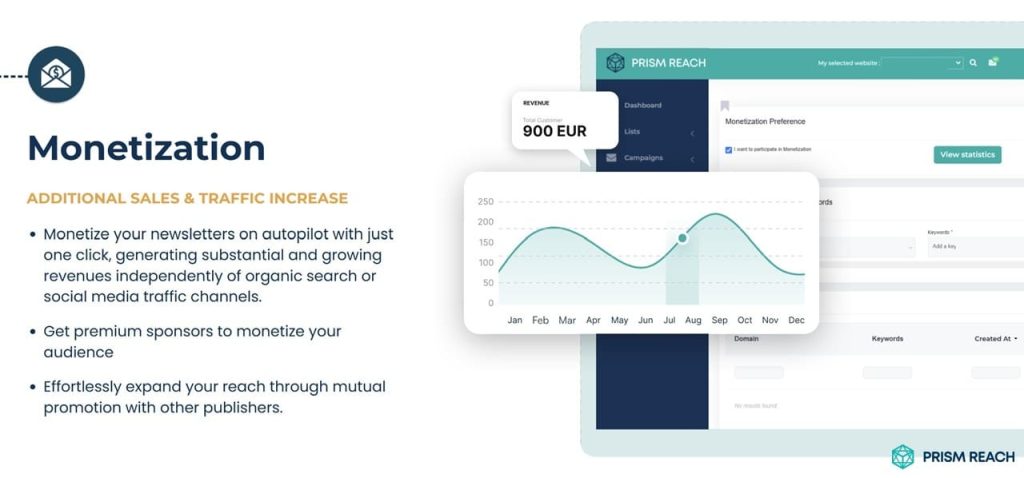
Benefits of Prism Reach
- Simplified Reporting: Prism Reach offers a clean, intuitive interface that makes it easy to access and interpret key metrics without navigating through a crowded dashboard.
- AI-Powered Insights: The platform’s AI-driven analysis provides actionable insights quickly, enhancing the efficiency of marketing strategies.
- Seamless Integration: With a quick setup process and seamless integration capabilities, Prism Reach minimizes the technical hurdles associated with data synchronization and reporting.
User Journey
The typical user journey with Prism Reach involves a streamlined process where subscribers sign up through a customized form, select their interests, and then receive personalized newsletters that cater specifically to their preferences. This journey not only enhances user satisfaction but also boosts the likelihood of long-term subscriber retention.
Compliance and Data Privacy
Prism Reach emphasizes GDPR compliance and hosts data within Europe, adhering to the highest standards of data protection. This focus on privacy is crucial for building trust with users and complying with international regulations.
Future Prospects
Looking ahead, Prism Reach aims to expand its technology into the eCommerce sector and explore new ways to leverage AI for broader marketing applications. The company is committed to continuous improvement of its AI algorithms, ensuring that its solutions remain at the cutting edge of technology and marketing innovation.
Upgrade Your Email Marketing with AI Personalization!
Conclusion
In the comparison between Zoho Campaigns and iContact, both platforms offer valuable features for email marketing. Zoho Campaigns stands out for its integration capabilities and advanced automation, making it suitable for businesses deeply invested in the Zoho ecosystem or requiring complex marketing workflows. iContact, with its user-friendly interface and scalable plans, is an excellent choice for small to medium-sized businesses prioritizing ease of use.
However, for those seeking cutting-edge personalization and AI-driven marketing solutions, Prism Reach presents an innovative alternative. Its advanced AI features and focus on deep personalization address the evolving needs of modern email marketing, potentially offering higher engagement rates and more efficient campaign management.
Implementing hidden gem strategies such as utilizing dynamic content, advanced segmentation, A/B testing, automating follow-ups, integrating with CRM systems, customizing email templates, leveraging reports, creating engaging signup forms, utilizing feedback loops, and participating in training webinars can significantly enhance the effectiveness of email marketing efforts with both platforms.
Moreover, adopting advanced data analysis techniques like cohort analysis, predictive analytics, and attribution modeling can provide deeper insights and enhance campaign performance. For those seeking a more robust and seamless solution, Prism Reach offers a compelling alternative. With its AI-driven personalization, advanced integration capabilities, and comprehensive data insights, Prism Reach empowers marketers to overcome the limitations of traditional email marketing tools like Zoho Campaigns and iContact.
As the email marketing landscape continues to evolve, staying informed about platform strengths and integrating innovative solutions will be key to maintaining a competitive edge. By leveraging these hidden gem strategies and utilizing advanced tools like Prism Reach, businesses can create more engaging, personalized, and efficient email marketing campaigns that drive better results and foster stronger customer relationships.
Citations
- Capterra. (n.d.). Compare iContact vs Zoho Campaigns 2024.
- PCMag. (n.d.). The Best Email Marketing Software.
- WinSavvy. (n.d.). Constant Contact vs VerticalResponse: A Comprehensive Guide.
- Zoho Campaigns Features. (n.d.). Zoho Campaigns Features.
- iContact Reviews. (n.d.). VerticalResponse Reviews.